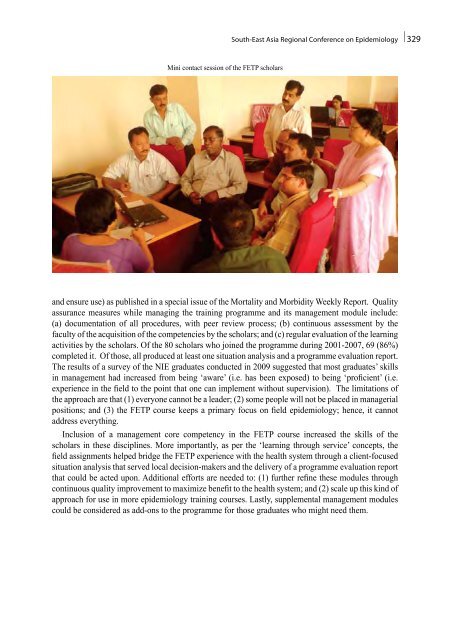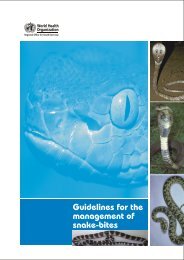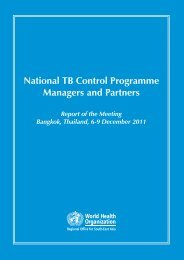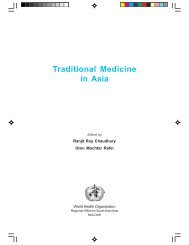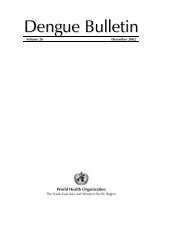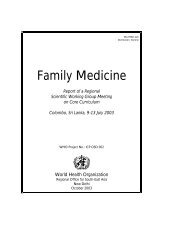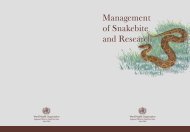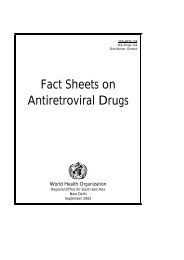South-East Asia Regional Conference on Epidemiology
South-East Asia Regional Conference on Epidemiology
South-East Asia Regional Conference on Epidemiology
Create successful ePaper yourself
Turn your PDF publications into a flip-book with our unique Google optimized e-Paper software.
Mini c<strong>on</strong>tact sessi<strong>on</strong> of the FETP scholars<br />
<str<strong>on</strong>g>South</str<strong>on</strong>g>-<str<strong>on</strong>g>East</str<strong>on</strong>g> <str<strong>on</strong>g>Asia</str<strong>on</strong>g> <str<strong>on</strong>g>Regi<strong>on</strong>al</str<strong>on</strong>g> <str<strong>on</strong>g>C<strong>on</strong>ference</str<strong>on</strong>g> <strong>on</strong> <strong>Epidemiology</strong> | 329<br />
and ensure use) as published in a special issue of the Mortality and Morbidity Weekly Report. Quality<br />
assurance measures while managing the training programme and its management module include:<br />
(a) documentati<strong>on</strong> of all procedures, with peer review process; (b) c<strong>on</strong>tinuous assessment by the<br />
faculty of the acquisiti<strong>on</strong> of the competencies by the scholars; and (c) regular evaluati<strong>on</strong> of the learning<br />
activities by the scholars. Of the 80 scholars who joined the programme during 2001-2007, 69 (86%)<br />
completed it. Of those, all produced at least <strong>on</strong>e situati<strong>on</strong> analysis and a programme evaluati<strong>on</strong> report.<br />
The results of a survey of the NIE graduates c<strong>on</strong>ducted in 2009 suggested that most graduates’ skills<br />
in management had increased from being ‘aware’ (i.e. has been exposed) to being ‘proficient’ (i.e.<br />
experience in the field to the point that <strong>on</strong>e can implement without supervisi<strong>on</strong>). The limitati<strong>on</strong>s of<br />
the approach are that (1) every<strong>on</strong>e cannot be a leader; (2) some people will not be placed in managerial<br />
positi<strong>on</strong>s; and (3) the FETP course keeps a primary focus <strong>on</strong> field epidemiology; hence, it cannot<br />
address everything.<br />
Inclusi<strong>on</strong> of a management core competency in the FETP course increased the skills of the<br />
scholars in these disciplines. More importantly, as per the ‘learning through service’ c<strong>on</strong>cepts, the<br />
field assignments helped bridge the FETP experience with the health system through a client-focused<br />
situati<strong>on</strong> analysis that served local decisi<strong>on</strong>-makers and the delivery of a programme evaluati<strong>on</strong> report<br />
that could be acted up<strong>on</strong>. Additi<strong>on</strong>al efforts are needed to: (1) further refine these modules through<br />
c<strong>on</strong>tinuous quality improvement to maximize benefit to the health system; and (2) scale up this kind of<br />
approach for use in more epidemiology training courses. Lastly, supplemental management modules<br />
could be c<strong>on</strong>sidered as add-<strong>on</strong>s to the programme for those graduates who might need them.


